Science Students’ Awards
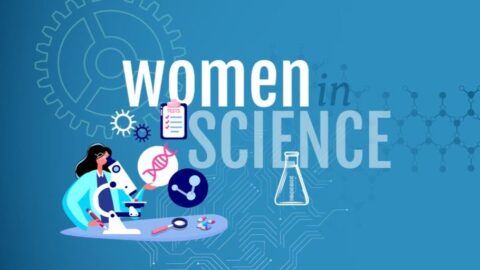
2023 has been a prolific year for Science. The scope of scientific concepts, laboratory workshops, investigative projects, and development of scientific skills are exemplified through an exhaustive list including several Science competitions such as the International Chemistry Quiz; Olympiad Examinations; the Big Science Competition; RACI Crystal Growing Competition; RACI Titration Competition; National Youth Science Forum and the ASTA SPECTRA Award.
Congratulations to the Science students listed below for their accomplishments in these competitions.
International Chemistry Quiz
In July, Science students participated in the R.A.C.I. International Chemistry Quiz. The Quiz attracted entries from schools in Australia, Asia, England, Canada, and Switzerland. The aims of the Quiz are to promote and encourage an awareness of the nature and relevance of chemistry amongst secondary school students. Selected Years 8 to 10 students, and all VCE Chemistry students participated in the Quiz. Congratulations to the following students for their outstanding efforts:
Year 8 Candidates
Zimo (Yoyo) Gu – Distinction
Year 9 Candidates
Yi Jun Gladys Lam and Irina Pan – Distinction
Diya Asthana and Jia Ni Ting – Credit
Year 10 Candidates
Hethushi Hapuarachchi and Natalie Wang – Distinction
Year 11 Candidates
Arabella (Arkie) Bertalli and Jixuan (Jennifer) Gao – High Distinction
Zenan (Amy) Chen, Alexis Chew, Angelina Chumbley, Sienna Lonetti, Tianqi (Jenny) Lu,
Wenxuan (Wendy) Lyu, Nadia Mohamed, Alice Molnar, Sienna Rigg, Saffron Scheele,
Zoe Shen, Chiu Mei (Anka) Tam, Jisu Yang, and Qing Chun (Joanna) Yang – Distinction
Shan Ni Ting and Xi (Sissi) Zheng – Credit
Year 12 Candidates
Lucia Tabbagh – High Distinction
Keyue (Karen) Deng, Flora Du, Tahlia Guzzardi, Qingyu (Eva) Liang, Yifei (Angela) Tang,
Caitlin Wang, Jemima Wilcox, and Wei (Wendy) Zhang – Distinction
Brydie Read received – Credit
High Distinction – Top 10% of students in the state.
Distinction – 10%-25% of students in the state.
Credit – The top 25%-40% of students in the state.
Olympiad Examinations
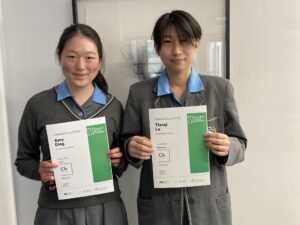 In August, this year over 5,000 students registered for the Australian Science Olympiad Examinations in Biology, Earth and Environmental Science, Chemistry, and Physics.
In August, this year over 5,000 students registered for the Australian Science Olympiad Examinations in Biology, Earth and Environmental Science, Chemistry, and Physics.
Designed to challenge top performers, students from schools across Australia registered to sit the two-hour examination. These challenges are the first stage of the selection process for the Australian Teams competing at the International Science Olympiads.
The Competition is coordinated by Australian Science Innovations, a not-for-profit organisation that runs the Big Science Competition and the Australian Science Olympiad Competition to encourage students to study science and consider science as a career.
Congratulations to:
- Amy Ding who received a Credit Certificate, placing her in the top 30%; and
- Tianqi (Jenny) Lu who received a Distinction Certificate, placing her in the top 20%.
SuperHack
SuperHack is an annual engineering hackathon hosted by the Melbourne University Electrical Engineering Club (MUEEC). It is MUEEC’s largest event of the year. It is an annual engineering hackathon where female, non-binary, and gender-diverse students in Years 10 and 11 compete in teams to solve engineering design challenges based on a set theme. The Competition took place on Saturday 18 November and Sunday 19 November. The following students participated for two days:
Team 1: Harriet Syme, Sophie Powell, Hethushi Hapuarachchi, Natalie Wang
Team 2: Vinuki Ranatunga, Karis Chan, Xiting (Christine) Chi, Aeryn Lee
Team 3: Annabel Taylor, Jiayi (Amelia) Chen, Isha Paithankar, Arabella (Arkie) Bertalli, Olivia Hargrave
Team 4: Amy Ding, Shan Ni Ting, Alexis Chew, Saffron Scheele, Qing Chun (Joanna) Yang
Congratulations to Team 3 who received second place.
“In line with the 2023 Superhack theme of ‘assistive technology’ the Blind Bling Babes designed and created several prototypes of the Blind Bling Range. Comprising of several stylish visually assistive wearables such as a hat, a leg band, and a belt that were all discretely fitted with an ultrasonic depth sensor, an Arduino board, a buzzer and was most importantly bedazzled to look like Paris Hilton’s Y2K dream. The hardware was then coded so that the frequency of the buzzes increased as distance from an approaching obstacle decreased. Thus, providing an innovative warning system for visually impaired individuals when they are approaching obstacles that replaces traditional methods.’ Arabella (Arkie) Bertalli
-
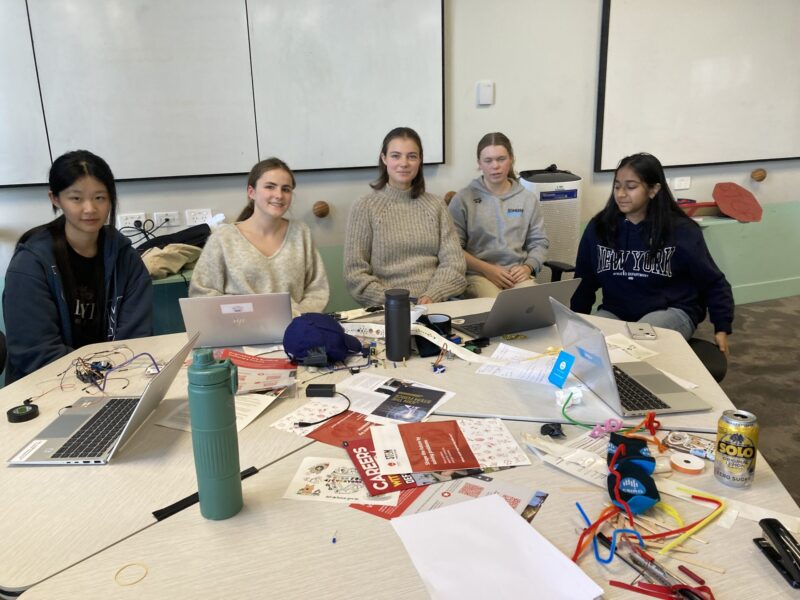
SuperHack 2023
-
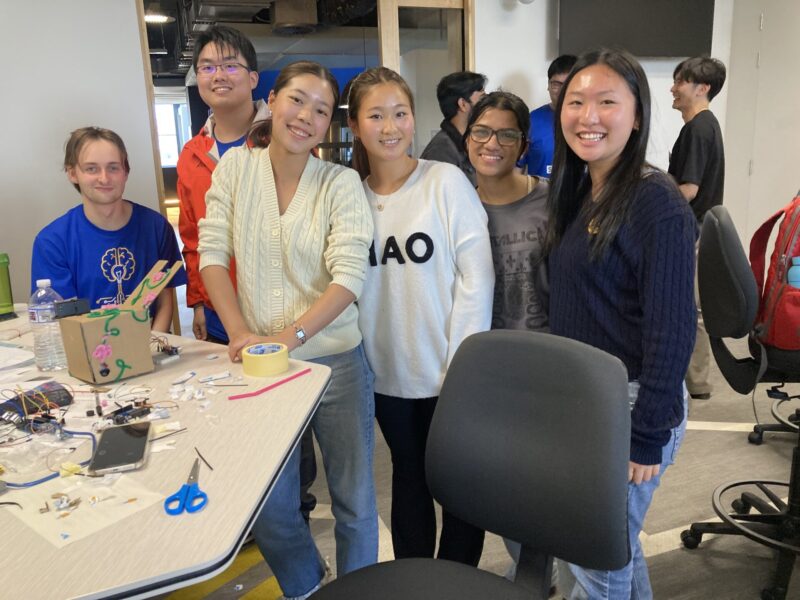
SuperHack 2023
-
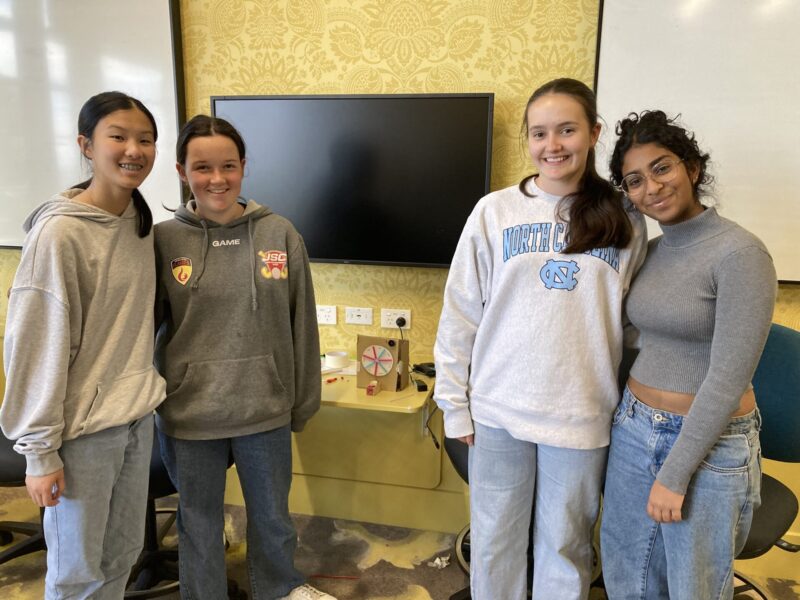
SuperHack 2023
-
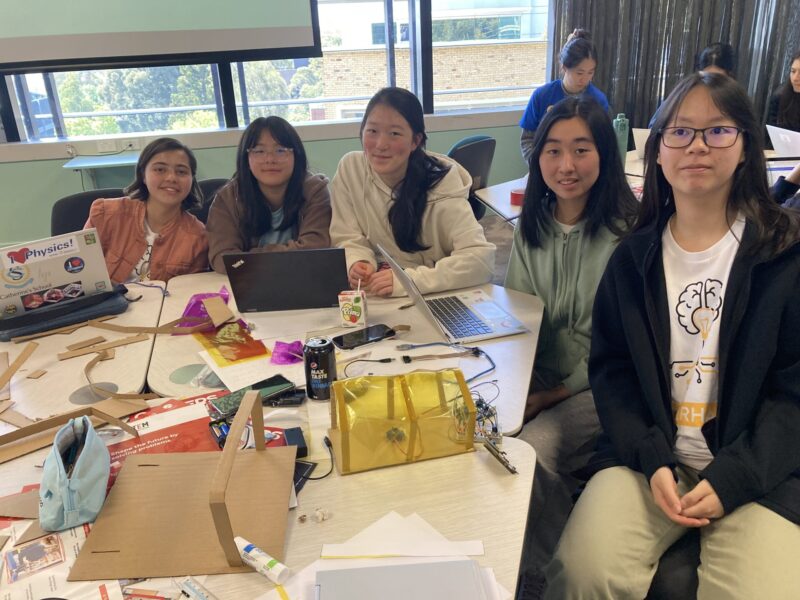
SuperHack 2023
ASTA SPECTRA Awards
SPECTRA, or Science Program Exciting Children Through Research Activities, is a national science award program developed and administered by Australian Science Teachers’ Association.
Shuao (Mia) Li, Tara Pattison, and Cheryl Li carried out a range of practical and observational activities, research, experiments, and projects to meet the criteria of a specific program, Kitchen Chemistry. The students completed the required number of activities to the satisfaction of the teacher and have been awarded the SPECTRA certificate. 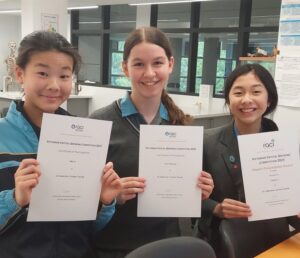
RACI Titration Competition
Year 12 VCE Chemistry students participated in the Royal Australian Chemical Institute Titration Competition during Term 3. The Competition is designed to encourage those students who enjoy Chemistry, particularly its practical side, to develop their skills and to reward those who attain a high level of proficiency. By participating in the Competition students were able to practise their laboratory skills using pipettes, burettes, and other glassware, recognising endpoints, and carrying out simple calculations. In the Competition, teams of three students performed a simple acid-base titration exercise within 90 minutes. Students were required to determine the concentration of three samples of ethanoic acid, commonly known as vinegar, using volumetric analysis to standardise a sodium hydroxide solution against a supplied hydrochloric acid solution and to then standardise the ethanoic acid solutions with the sodium hydroxide solution.
Judging was on the basis of the values each team reported for the titres and concentrations of the sodium hydroxide and ethanoic acid solutions.
Congratulations to Brydie Read, Mietta Passon and Freya Cantwell who received a Silver Certificate ranking and Caitlin Wang, Qingyu (Eva) Liang, and Keyue (Karen) Deng who received a Bronze Certificate ranking.
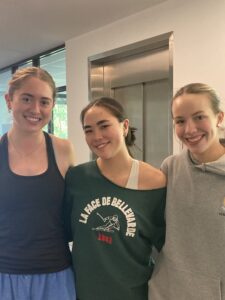 |
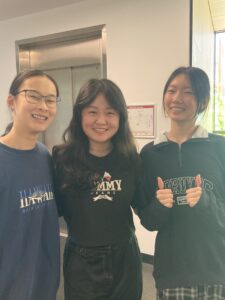 |


